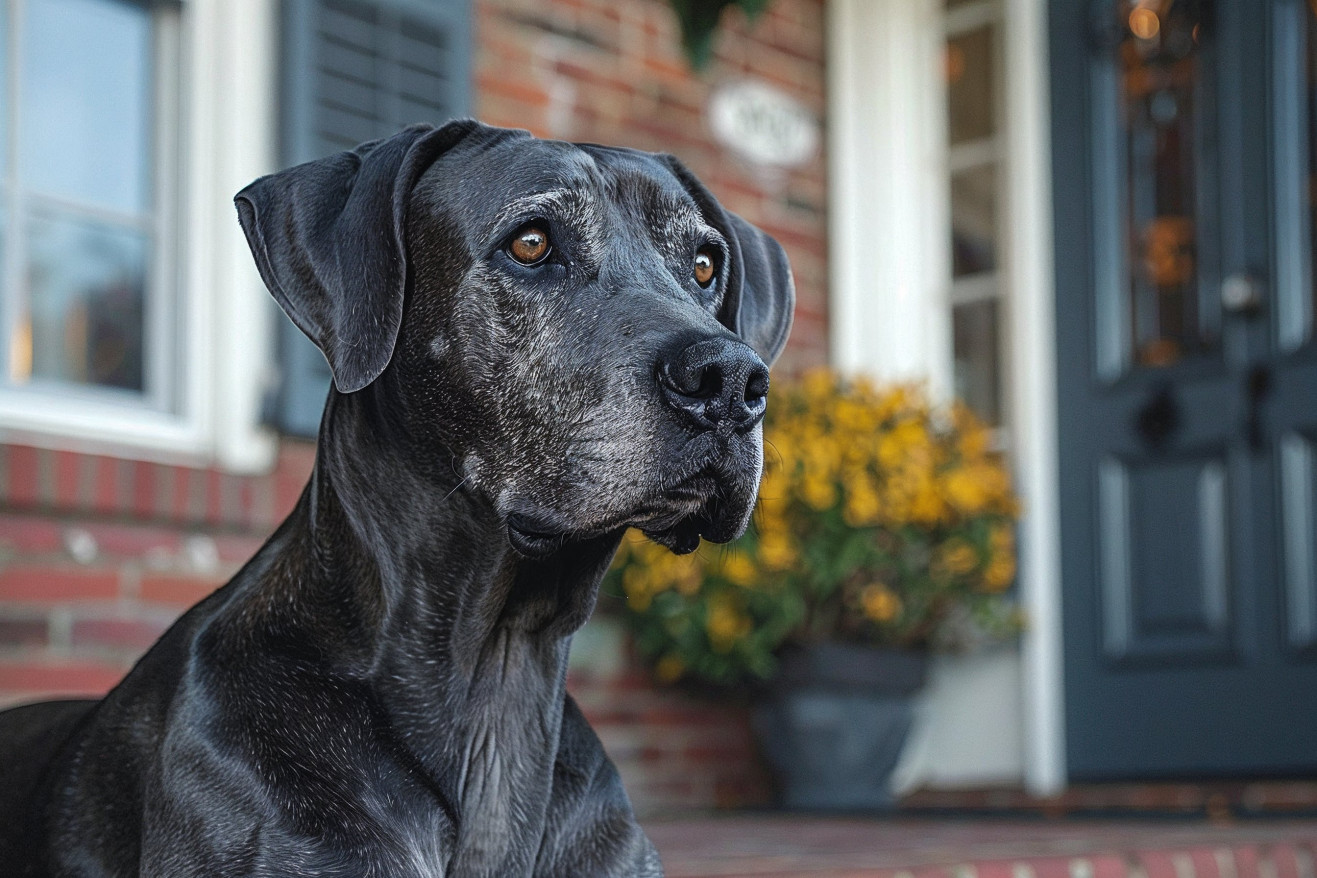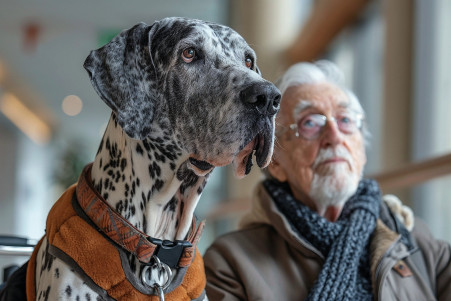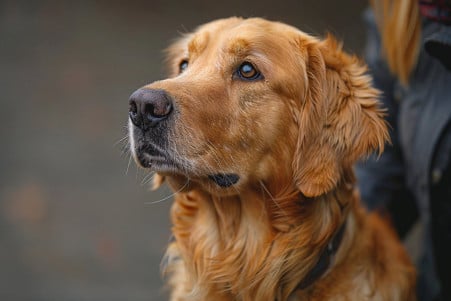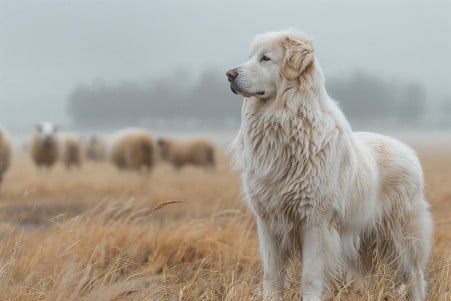Do Great Danes Make Good Guard Dogs? How to Train Your Gentle Giant
13 April 2024 • Updated 11 April 2024

If you want a Great Dane that will be a loving family pet and an effective guard dog, you can have both. With the right training and socialization, Great Danes can be great guard dogs. Great Danes were originally bred to hunt large game like wild boar, so their size and natural protective instincts can make them suspicious of strangers. However, socialization and positive reinforcement training are key to bringing out their guarding instincts while preventing them from becoming aggressive.
We've researched animal behavior studies, dog training manuals, and breed information to find out what it takes to make a Great Dane a good guard dog. We'll explain why socialization is important, how consistent training can help you encourage guarding behaviors, and how to make sure your dog is obedient and responsive. We'll also talk about the factors that can make some Great Danes less successful as guard dogs and how to assess your dog's personality. By the end, you'll know what it takes to train a well-behaved, reliable Great Dane guard dog.
Do Great Danes make good guard dogs?
The Role of Early Socialization and Training
Early socialization and positive reinforcement training are important to ensure that a Great Dane grows up to be a protective yet well-behaved guard dog. As noted by iHeartDogs, it's important that Great Dane puppies are socialized to ensure they don't develop fear or aggression toward new people, animals, or situations.
One way to do this is by signing up for puppy socialization classes, something that's highly recommended by trainers like Russell Hartstein, who is cited in an AKC article. This will give the puppy the opportunity to interact with new people, animals, and places in a safe and controlled environment. Meanwhile, consistent positive reinforcement training that involves treats and praise is important for teaching the dog to exhibit certain guarding behaviors, such as barking on command, as described in Wag!'s training guide.
In addition, it's important to make sure that a Great Dane is well-trained on a leash as it grows. As explained by The AKC, this can be accomplished by using front-attaching harnesses and martingale collars, which help ensure that the dog can be controlled during walks without interfering with their movement. This training will help ensure that the dog is well-behaved and responsive, which is important for a Great Dane that is expected to be a family guard dog. With the right socialization and positive reinforcement, a Great Dane's natural protective instincts can be encouraged and directed in a positive way.
How Great Danes Compare to Other Guard Dog Breeds
Great Danes are physically larger and more intimidating than many other guard dog breeds, which can help them to be more effective as a deterrent. According to a Quora discussion, their size and natural protective instincts make them good candidates for guard dog work. However, their friendly and gentle nature can mean they are less protective and aggressive than breeds like Doberman Pinschers or German Shepherds.
Although Great Danes can be good watchdogs, the Purina article on working dog breeds explains that some breeds such as Rottweilers or Cane Corsos have a stronger guarding instinct. Great Danes need to be well-trained to avoid aggression because of their large size and strength, as mentioned in the Quora discussion. As a result, they are often best suited as family pets that can also act as a deterrent when properly trained.
Legal and Liability Concerns for Great Dane Owners
Owning a dog, especially a large breed like the Great Dane, can lead to legal liabilities if the dog bites or attacks someone. Many home insurance companies have lists of banned or restricted dog breeds they will not cover, although the details of these policies vary, according to Forbes Advisor. While Great Danes are not typically on these lists, the breed's size may result in higher premiums or coverage exclusions.
To protect themselves, ValuePenguin suggests that Great Dane owners purchase additional liability coverage or standalone dog liability insurance. According to XINSURANCE, animal liability insurance can cover legal fees and damages that are awarded if the injured party sues. In addition, dogbitelaw.com recommends that dog owners have a minimum of $100,000 in liability insurance, with $300,000 or more being better.
Local laws may also require things like certificates of insurance if a dog is labeled potentially dangerous. Knowing these legal and liability concerns is important for Great Dane owners who want to take advantage of the breed's natural guarding instincts while keeping their families and communities safe.
Other Jobs for Great Danes
In addition to protection, the Great Dane's size, strength, and protective instincts make them well-suited to a number of other working roles. For example, as noted in Unleashing Greatness: The Great Dane as a Service Dog, Great Danes can be trained to be service dogs, helping with mobility issues or providing emotional support. Their size and gentle nature make them well-suited to these other service dog roles.
In addition, some Great Danes can be trained to do other jobs, such as tracking, search and rescue, or competitive obedience, as discussed in Fulfill Your Dog's Ancestral Calling with Job-Specific Activities. Meanwhile, the Purina article on working dog breeds points out that working dogs like the Great Dane are adaptable and can be trained to take on a number of different jobs.
Knowing what makes Great Danes unique can help you figure out the best job for your dog, whether that's a loving family pet, a service dog, or a dog with another type of job.
Great Danes as Family Dogs
In spite of their size, Great Danes are known for their friendly, patient, and loving nature with families. As Hill's Pet explains, they are even commonly referred to as 'gentle giants' and can be great family dogs if they are trained and socialized well. The AKC even says that Great Danes are "excellent family dogs" because of their patience and affection with kids.
Although they should be supervised around small children to avoid accidental knocking over, The Spruce Pets points out that Great Danes are good family dogs. Their loyalty, intelligence, and ease of training, as noted by Britannica, all make them good family pets.
Even though Great Danes can be good watchdogs, Hill's Pet explains that they are often seen as well-behaved, loving family members first and foremost. If they are trained and socialized properly, these gentle giants can be reliable, loving family dogs.
Conclusion: How to Train a Great Dane to Be a Good Guard Dog
Great Danes can be good guard dogs with the right training and socialization. Their size, protective instincts, and loyalty mean they are naturally suspicious of strangers and can be effective deterrents. However, consistent positive reinforcement training is essential to ensure any aggressive tendencies are kept in check and the desired guarding behaviors are encouraged.
While they may not be as protective as other breeds, Great Danes are excellent watchdogs for families because of their gentle nature and imposing size. Knowing their traits and temperament is important to ensure you raise a well-behaved, reliable Great Dane guard dog.


